In the 20 months since Donald Trump began his successful campaign for president, he has said he wants to round up millions of Hispanics and ship them out of the country. He’s suggested putting every American Muslim on a national registry. He’s retweeted posts from white supremacist websites, causing anxiety among African Americans and Jews. Those in the LGBTQ community fear Trump will nominate Supreme Court justices who will overturn the decision that gave them the right to marry. Along the same line, many worry about Roe v. Wade. To top it off, Trump’s transition team leader for the Environmental Protection Agency is a prominent climate change denier.
So, what are Memphis residents who will be affected by the forthcoming changes doing to prepare for Trumpland? For most, the tears from election night have dried, replaced by vigilance and a determination to resist oppression and fight for the rights and beliefs they hold dear. They are refusing to be Trumped.
Here’s what they told us.
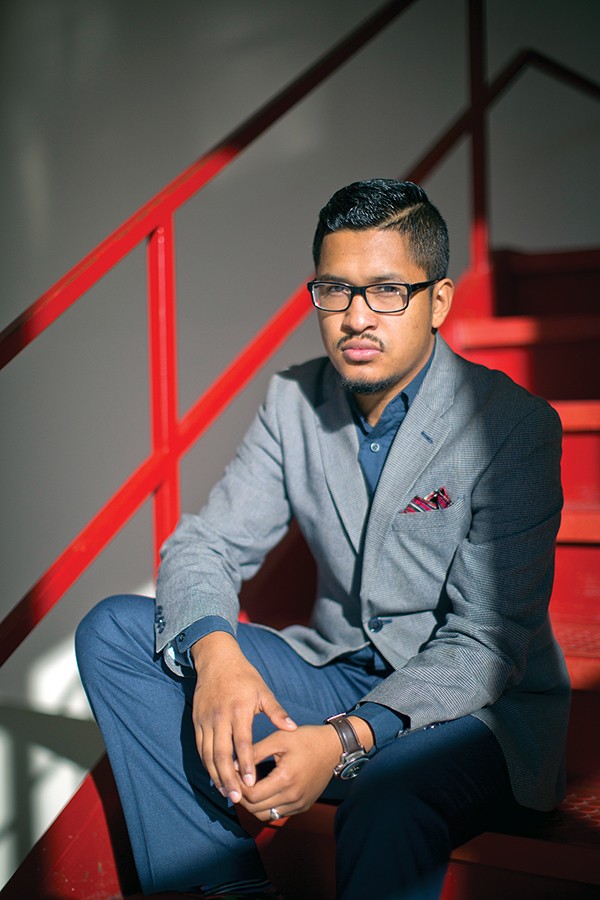
Alex Ortiz
“Scared and uplifted”
The morning after Trump’s upset victory over Hillary Clinton, Alex Ortiz awoke to his little sisters fearfully asking what might become of their family. Ortiz didn’t have an answer.
“They are 8 and 10, but they know how this will change my mother’s life and their father’s life,” Ortiz, 24, says. “They know how it will change my life. They are U.S. citizens, but they have a family that could be broken up if Trump decides to ramp up the immigration system.”
President Trump could use the same executive authority that President Barack Obama used to created the Deferred Action for Childhood Arrivals (DACA) immigration program to sign it away.
That directive protects those who emigrated to the U.S. before the age of 16 from deportation, while granting them work authorization and a Social Security number. Trump, however, has said he’ll immediately deport two to three million undocumented immigrants, standing firm on the rhetoric that fueled his campaign: “When Mexico sends its people, they’re not sending their best,” he said during his presidential announcement speech in June 2015. “They’re bringing drugs. They’re bringing crime. They’re rapists. And some, I assume, are good people… .”
In 2003, nine years prior to Obama signing DACA into law, a coyote smuggled a bus full of women and children, including 10-year-old Ortiz and his mother, from Honduras to the Mexican border. When Ortiz qualified for DACA in 2012, he was a college sophomore, 19 years old, and atop his class, academically.
In 2003, as he crossed into the U.S., shivering in the cold with his mother, he was wearing just his underwear and had no comprehension of why she’d upended their lives. His father’s alcoholism and death threats behind them, the U. S. ahead, she gripped his hand as they crossed a river into Eagle Pass, Texas, where they were granted a six-month stay at a U.S. Border Patrol station. Soon they’d be reconnected with family in Memphis, and, soon after that, they would overstay their visas.
“I came here in fifth grade,” Ortiz says. “I knew no English, but I was used to being the smart kid. The first few months, I sat in class and cried because I didn’t understand a thing. In a six-month period, I went from speaking zero English to getting straight A’s.”
Ortiz maintained that drive, becoming the valedictorian of his high school class. He applied to more than 25 colleges and was accepted to all of them but wasn’t offered full financial assistance because he was undocumented.
“My goal was to go to school without paying a dollar because I knew my mother couldn’t afford it,” Ortiz says. He ended up at Tougaloo College in Jackson, Mississippi, his objective accomplished.
“[DACA] changed my life in so many ways,” Ortiz says. “It not only allowed me to work, it allowed me to get a driver’s license.”
DACA opened other doors. He interned with Congressman Bennie G. Thompson, a member of the Committee on Homeland Security. He became a Google student ambassador. He works as a recruitment counselor for Southwest Tennessee Community College. He fears that Trump will wipe all of his progress away.
“If Trump does take DACA away, he’s really going to take everything I have built,” Ortiz says. “My job, my degree.”
Ortiz, one of 13,000 immigrants who have qualified for DACA in Tennessee, says that though each member of the Latino community carries different strengths, they have one trait in common: resilience.
“I was scared when he was elected, but now I am uplifted,” Ortiz says.
— Joshua Cannon
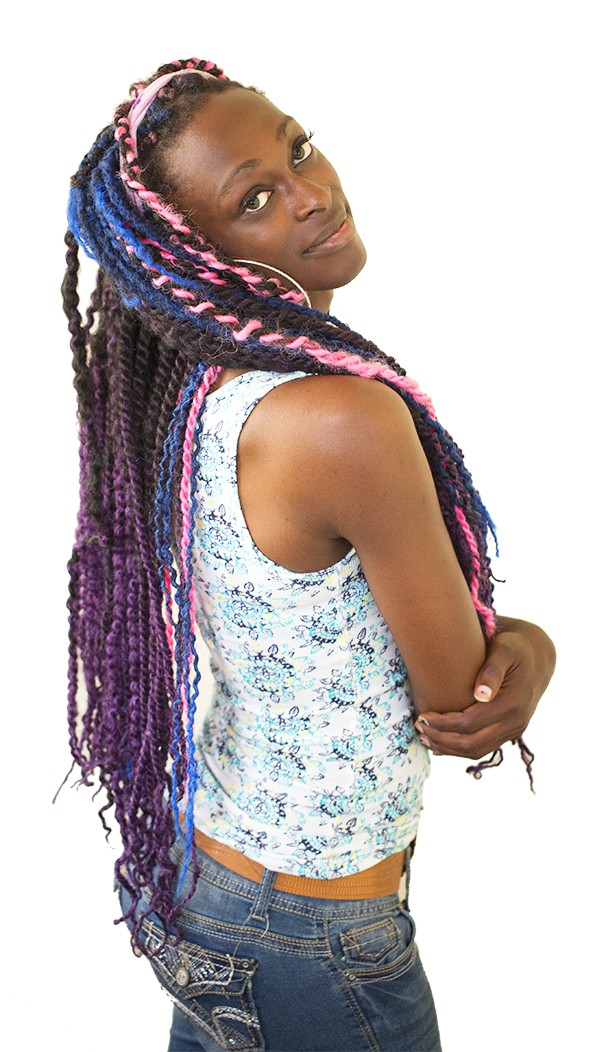
Ellyahnna Wattshall
“A nightmare come true”
Lisa Michaels and her girlfriend, Ellyahnna Wattshall, weren’t in the same room when Trump was declared the winner of the 2016 presidential race, but their reactions were identical: shock, horror, and tears.
“It really felt like I was watching a nightmare come true,” said Wattshall.
Michaels, a comedian, was performing at the Hi-Tone. She struggled to get through her set as the electoral votes started to take a turn for the red.
“It was really, really hard getting through that one,” Michaels said.
The next few mornings would start with tears for Michaels. For Wattshall, they would start with outright fear.
Both Michaels and Wattshall are transgender women, a segment of the LGBTQ population that Republican lawmakers focused on over the summer, as some states took measures to control public restroom access.
Since then, hate-related incidents are on the rise against transgender citizens, according to the Southern Poverty Law Center (SPLC) and the Human Rights Campaign. In 2015, the highest homicide rate of transgender individuals was recorded, with 21 murders. That record has already been surpassed this year. Since Trump’s victory, the SPLC has recorded nearly 100 hate-related incidents against LGBTQ individuals.
“I was homeless for five years,” Wattshall says, “and during that time, I never thought I needed a weapon to protect myself. Now, I feel like it’s come to that.”
Michaels is more worried about the team forming behind Trump. “Trump isn’t going to be president,” she says, “Mike Pence is. Trump is a fool who spends most of his time on Twitter. But I see who he’s picking for Cabinet members, and that really scares me.”
For now, all Wattshall or Michaels can do is steel themselves for it. Wattshall is busy working on projects that aim to identify safe networks and places for transgender citizens. Michaels will likely continue to bring her presence to the comedy scene, increasing visibility for transgender Memphians and helping others laugh through their tears.
The dismay they both feel isn’t likely to go away anytime soon.
“I’m really disappointed,” said Michaels. “I’m disappointed in the American public, that we’ve become that fucking stupid.” — Micaela Watts
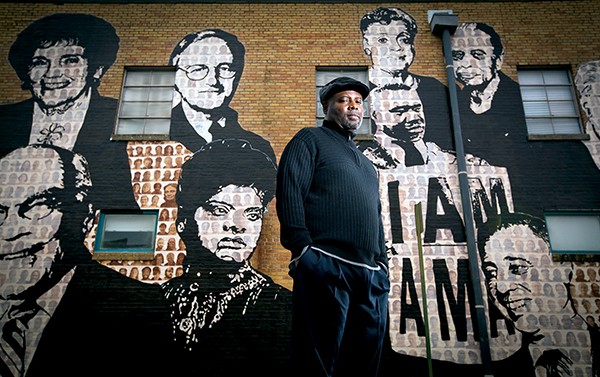
Steve Becton
“Unsafe”
Facing History and Ourselves, an international nonprofit organization, helps people have difficult conversations about race. Steven Becton is the associate program director for urban education at the organization’s Memphis office.
Memphis Flyer: How big of a deal is Donald Trump’s election for you?
Steven Becton: The Trump election puts us in this pivotal moment. We have to make a conscious choice about what kind of country we’re going to be. Are we going to be an inclusive country? Or, will we be even more divided because of the rhetoric that led up to the election?
Can you give me an example?
Some of the rhetoric around his plan for rounding people up is making people feel unsafe. Also, his descriptions of the African-American community, especially this notion that we’re worse than we’ve ever been and that you can walk into our communities and get shot. Those descriptions were not in keeping with the way we view our community.
Many Trump supporters have openly spouted racist views.
I’m always really careful to not dehumanize all [Trump supporters] or label them all as racists. People were supporting Trump for very different reasons. It would be irresponsible to say all those people are racists. But I would say, the kind of fear that people were feeling — my 17-year-old daughter, for example — was not feeling as safe as she’s always felt because of some of the rhetoric and because of some of the violence that was happening in these rallies.
Are you worried about certain policy areas?
Something I want to keep an eye on is education. What would the new Secretary of Education do from a policy standpoint? How is that policy going to affect education reform movements for kids that are socio-economically disenfranchised in school. Will that policy lead to further disenfranchisement, or is that policy going to be about keeping us moving forward?
The other thing we should be closely watching is criminal justice reform. We have to stop this pipeline to prison, especially for African-American boys. To the degree that Mr. Trump is interested in that, I’m not sure.
How does the election position Facing History and Ourselves?
People need some tools on how to talk about this. People are finding out that, while they didn’t support Trump, some of their friends and family members or classmates did, and they can’t understand how people they love supported Trump.
Those people have to be able to talk to each other again. So, it’s not just about how the politicians are going to work together, but how everyday people are going to talk to each other. — Toby Sells
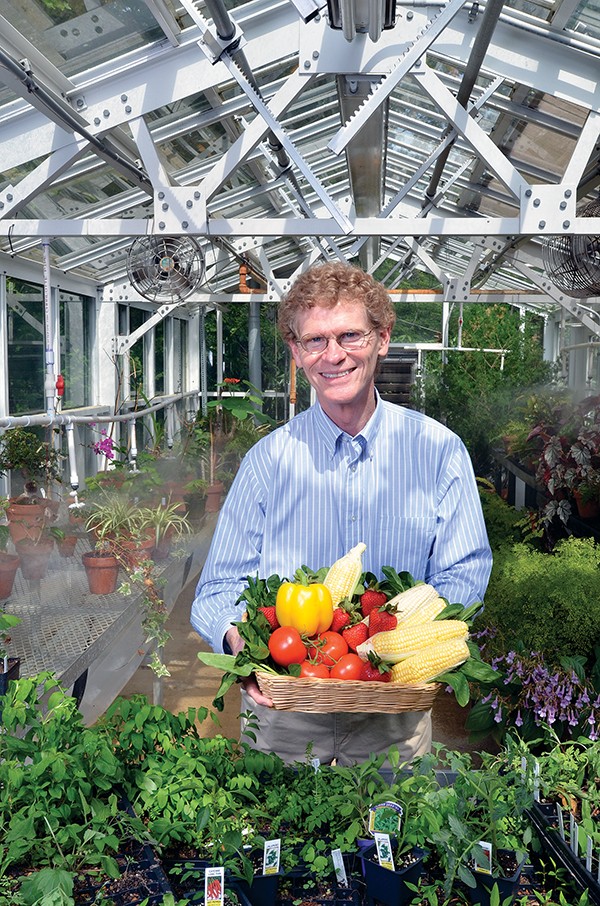 Larry Kuzniewski
Larry Kuzniewski
Cary Fowler
“Do I feel lucky?”
Norway’s Global Seed Vault is carved deep into the side of a mountain in the Svalbard archipelago, just above the Arctic Circle. The fail-safe library shelters more than 5 billion duplicates of seed samples from crop collections around the world.
Cary Fowler, who was raised in Memphis and spent a great deal of time on his grandparent’s farm in Madison County, runs the project. It was his time on the farm in Tennessee that gave him an understanding about the importance of agriculture. To that end, Fowler says there’s one thing that should remain a nonpartisan concern: climate change.
“In my particular area, whether you call it climate change or call it a string of coincidences or you just say we’ve been having bad weather a lot lately, there are things that we as a country and as a society need to be doing,” Fowler says. “When your politics are at odds with science, it’ll be your politics that have to change. Science has a way of being persistent.”
A little more than a month away from Trump’s inauguration, the president-elect has sworn to cut President Obama’s Clean Power Plan. Trump is being advised by climate-skeptic Myron Ebell, who will head the Environmental Protection Agency transition team and once likened climate change to a global political movement.
The effects climate change will have on our crops and future food supply could be devastating, Fowler says.
“Let’s hope the new administration, which has said it wants to help the rural areas of our country develop, will understand that farmers need adaptive crop varieties,” Fowler says. “You can’t talk to many farmers these days without hearing about the challenges they face in terms of weather fluctuation, heat, new pests, and diseases.”
Fowler likens the results of climate change to a scene from Dirty Harry, when Clint Eastwood stands over a robber, staring down the barrel of his .44 Magnum. Eastwood says, “You’ve got to ask yourself one question: ‘Do I feel lucky?'” — JC
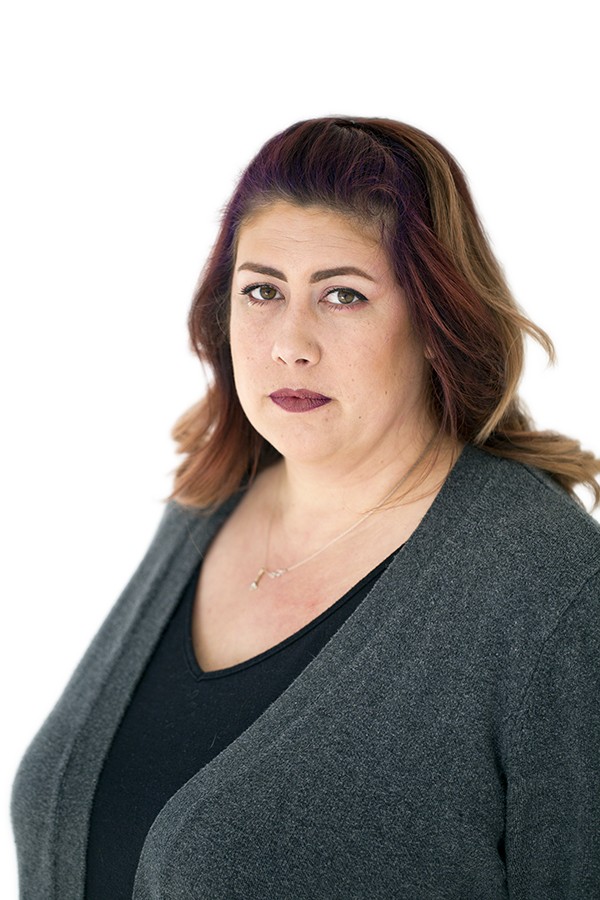
Cara McLane
“The dirty word”
When Cara McLane woke up on the morning after the presidential election, she was consumed by a singular emotion. “I was pissed. I was extremely angry,” McLane said. “I sat down and tried to figure out why I was so angry. And, what it comes down to, it’s because I’m extremely scared.”
For McLane, who has been steadfast in her advocacy work for women’s health and reproductive issues, it’s the possible Cabinet appointments that terrify her.
Trump has tapped Tom Price, a Republican Senator from Georgia who has supported efforts to ensure Planned Parenthood is federally defunded, as the Secretary of Health and Human Services. Price has insisted that women have no challenge when it comes to being able to afford birth control. His appointment tells McLane that she will be very busy for the next four years.
“When I say busy, I mean as someone who talks to the public about being pro-choice,” she says. “Having an argument is not going to get anybody to listen. It’s going to have to be more of an education.”
McLane, a former church youth group leader who identifies as a Christian, has spent ample time in delicate conversation with those who are anti-abortion and are so because of their religious beliefs.
She understands how religious beliefs lead to an anti-abortion stance, but is firm in her belief that “someone’s religion or their point of view should have nothing to do with a woman’s health-care decision.”
The Supreme Court thought so, too, in 1973, when their decision in the landmark case of Roe v. Wade established the constitutional right to abortion as the law of the land. With Trump’s Cabinet filling with established anti-abortion appointees, and Trump’s all-but-guaranteed ability to appoint the next Supreme Court justice, McLane’s worries extend beyond abortion.
“Planned Parenthood, Choices … those places are health-care providers first,” says McLane, adding that for many women, Planned Parenthood is the only affordable option for reproductive health care.
If Planned Parenthood is defunded and the Affordable Care Act repealed, “It’s not about abortion, which is the dirty word,” said McLane. “It’s about where are these women going to go to find out if they have cancer?”
Keeping Planned Parenthood’s doors open for at least the next four years will be a top priority for McLane and countless others. “I find it really interesting that in the Republican party, the only thing they really want to regulate is a person’s sex life, whether it’s gay marriage, birth control, or abortion.” — MW
“Well, I love you, too, America!”
Nur Abdalla has a beef with Trump.
Abdalla is a Muslim. Her mother is African American. Her dad is an Egyptian immigrant. And, of course, she’s a woman. So, she’s feeling pressure from Trump’s promises and rhetoric on many sides. But her beef goes deeper, gets even more personal than that — her wedding.
“My family and my fiance’s family were meeting, and we were supposed to be talking about … wedding stuff,” Abdalla says. “The whole time it was just our parents talking about Trump. After we ate and left for home, both our families realized that we didn’t talk about what we were supposed to talk about. So, I have a little bit of a personal issue with him. Trump’s hijacking my wedding planning.”
Humor is a staple in her family when dealing with life’s tough moments, Abdalla says. And lately, there’s been a lot of humor. But now it’s time to get serious.
Trump has been talking about Muslims from the day he started his campaign. He’s waged a war of words on “radical Islam,” has called for a ban on Muslim immigrants, has suggested a screening test to filter out immigrants who support Sharia law, and has gone so far as to suggest creating a Muslim registry.
“There’s a part of me that would like to say that [the Muslim registry] would never happen,” Abdalla says. “But there’s also a part of me that knows that something like that has happened in the past with other groups of people.”
Abdalla cites the internment camps of World War II, where 120,000 Japanese-Americans were forced to live. She knows the future could bring troubled times for her and her family.
Before election night, Abdalla says she thought Trump’s campaign was kind of a joke. “His platform was based on a lot of hatred and ignorance, plus he’s just rude.” When she got the news the next day, she was shocked, but on another level, not shocked. Trump’s rhetoric, the energy of his supporters, the violence at his campaign rallies, it all made for an explosive atmosphere that energized thousands, she says. That energy, seemingly aimed at her and many she knows, disappointed and saddened her. “I was kind of like, ‘Well, I love you, too, America.'” — TS
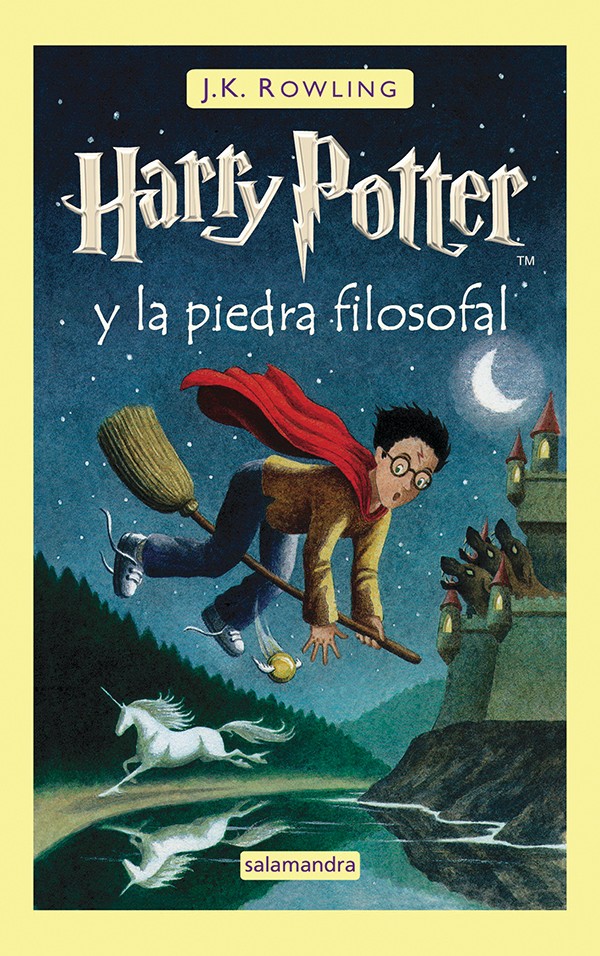



 Larry Kuzniewski
Larry Kuzniewski 